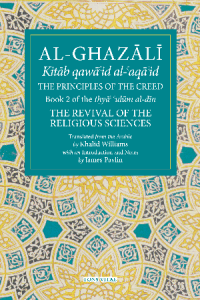Al-Ghazali The Principles of the Creed (Ihya Ulumuddin Series No. 2)

Author: Imām Al-Ghazali
Translator: Khalid Williams
Publisher: Fons Vitae Publishing
Year of Publication: 2016
Print Length: 168 pages
Genre: Islamic Studies / Quranic Studies; Theology, Ethics and Philosophy; Islamic Law & Jurisprudence, Science; Qur’anic Reflection, Supplication & Prayers; Non-Fiction / Religious Studies
Topic: Allah ﷻ, Prophet Muhammad ﷺ, Islam, Qur’an, Aqidah/Creed
In the Principles of the Creed (Kitab Qawa’id al-‘aqa’id), the second of the forty books of the Revival of the Religious Sciences (Ihya’ ‘ulum al-din), Abu Hamid al-Ghazali explains the fundamental beliefs of Islam, those that concern faith in God, His revelation, His messengers, and the hereafter. The scope of these beliefs includes the nature of God, Muhammad’s status as a prophet, the virtues of the Companions, the events related to the resurrection and judgment, and the nature of faith itself. This presentation of beliefs goes beyond a list of creedal statements; al-Ghazali cites the scriptural foundations in the Qur’an and hadith, refers to transmitted reports from the Companions and others from the righteous predecessors, and supports these beliefs with rational arguments.
Table of Contents
Editor’s Note
Biography of Imām al-Ghazālī
About the Revival of the Religious Sciences
Introduction
THE PRINCIPLES OF THE CREED
Chapter 1
An Exposition of the Creed of the People of the Sunna [with regard to] the Two Testimonies of Faith, which are One of the Foundations of Islam
Unity / Transcendence / Life and Omnipotence / Knowledge / Will / Hearing and Sight / Speech / Acts / The Meaning of the Second Testimony [of Faith] is Bearing Witness to the Messenger of the Message
Chapter 2
On Imparting Religious Instruction Gradually, and the Stages and Levels of Conviction
Inquiry of the Ruling on Studying Debate and Theology / Inquiry: Is There an Outward Creed and an Inward Creed? / Inquiry on the Difference Between the Outward and the Inward
Chapter 3
Shining Proofs of the Creed, Entitled “The Jerusalem Epistle on the Principles of the Creed”
The First Pillar of Faith: Recognition of the Essence of God, and that God is One / The Second Pillar of Faith: Knowledge of the Attributes of God / The Third Pillar of Faith: Knowledge of the Acts of God / The Fourth Pillar of Faith: Belief Based on Transmitted Reports and Believing in What [the Prophet ﷺ] Conveyed about God
Chapter 4
On Faith (Īmān) and Islam, What Connects and Separates Them, Whether Faith Can Increase and Decrease, and Whether the Predecessors Qualified Their Claims by Faith [by Saying “God Willing]
Inquiry: Is Islam Identical with Faith (īmān), or Distinct from It? / Inquiry: On the Increase and Decrease of Faith / Inquiry: Is It Acceptable to Say, “I am a Believer, God Willing”
Bibliography
Indexes: Index of Qur’ānic Verses / Index of Hadīth / General Index
About the contributors

Imām Abu Hamid al-Ghazali is a 11th century Muslim scholar. He was one of the most prominent and influential philosophers, theologians, jurists, and mystics of Sunni Islam. Al-Ghazālī was born at Ṭūs (near Mashhad in eastern Iran) and was educated there, then in Jorjān, and finally at Nishapur (Neyshābūr), where his teacher was al-Juwaynī, who earned the title of imām al-ḥaramayn (the imam of the two sacred cities of Mecca and Medina). He was active at a time when Sunni theology had just passed through its consolidation and entered a period of intense challenges from Shiite Ismâ’îlite theology and the Arabic tradition of Aristotelian philosophy (falsafa). Al-Ghazâlî understood the importance of falsafa and developed a complex response that rejected and condemned some of its teachings, while it also allowed him to accept and apply others. His great work, Iḥyāʾ ʿulūm al-dīn or Ihya Ulumuddin (“The Revival of the Religious Sciences”), made Sufism (Islamic mysticism) an acceptable part of orthodox Islam.
Source: https://plato.stanford.edu/entries/al-ghazali/
More from Imam al-Ghazali in this library, click here.

Khalid Williams was born in the UK in 1983. He graduated from Leeds University in 2006 with a BA in Arabic Studies, and moved to Morocco to teach and further his studies in the traditional Islamic disciplines. He began working in translation in 2009, with an emphasis on Islamic Studies and Sufism.
Source: https://its.org.uk/catalogue/the-pure-intention/
More from Khalid Williams in this library, click here.
